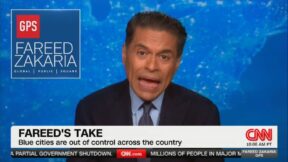WaPo’s New Opinion Editor On The Paper’s Pivot: Being ‘Overwhelmingly Left-Leaning’ Is Not Good Business

Reason’s Nick Gillespie spoke with The Washington Post’s new opinion editor, Adam O’Neal, on the Wednesday episode of his podcast, which is titled, “Is The Washington Post Becoming Libertarian?”
Gillespie asked O’Neal to expound upon the changes happening at The Post, which has included a mass exodus of writers and editorial board members as the paper has reshaped itself under new leadership.
In February, The Post’s owner, Amazon billionaire Jeff Bezos, announced the paper would shift the focus of its op-ed pages. “We are going to be writing every day in support and defense of two pillars: personal liberties and free markets. We’ll cover other topics, too, of course, but viewpoints opposing those pillars will be left to be published by others,” he wrote in a lengthy memo at the time.
Bezos had stirred controversy during the 2024 presidential campaign by stopping the paper from running its endorsement of Kamala Harris.
“How are people responding to the changes since you’ve been at the helm of the opinion section?” Gillespie asked O’Neal.
“We still have quite a lot of readers and subscribers. I’ll say, I’ve worked at smaller places, and it’s a robust audience. And you know, when you write something in The Post, someone notices it. That said, it needs to get bigger. And the audience now is overwhelmingly left-leaning. Everybody knows that as the data is available,” O’Neal replied.
“And that’s for the whole paper?” asked Gillespie.
“Yeah, the entire paper. Probably the opinion section. I don’t have the breakdowns in front of me. And we value those subscribers. A lot of them have been loyal subscribers for decades. And we’re not trying to push them away and make this a MAGA project where they’ll be deeply offended by everything we write,” O’Neal replied, adding:
At the same time, I don’t think it’s a great business model to have one sort of mono—it’s not entirely monolithic—but one very similar audience. And so we’re trying to continue to serve our existing subscribers, who we value, while also looking at people—I don’t know, like my dad—who frankly never would have subscribed to The Washington Post, who just wouldn’t have trusted it, and say, ‘Look, we’re doing things different at the opinion section.
There’s going to be a lot of stuff you disagree with, but you ought to find it interesting. We’ll challenge you and educate you. And there may be things that you find that you’re agreeing with that you wouldn’t have seen before. Or you might’ve seen here or there, but not as frequently.’
And one thing I’ve noticed that’s been very encouraging, when I break down the data, is that a lot of stories are doing particularly well with non-subscribers. There are people who were kind of looking past The Post in the past and now are giving it another look. And this is a long process, right? It takes years. You’re going to have to write editorials hundreds of times on different subjects where people start to realize, ‘Oh, this is interesting. This is something I’d actually pay for.’
So we’re not taking anything for granted—whether it’s the people we need to win over or the people we want to keep and remain happy subscribers. And it’s a tough balancing act. Where do you fit in? And some folks simply will see stuff that we’re publishing now that I think is interesting and engaging, and they’ll disagree with me, and they wanna leave.
But I think overwhelmingly, by having this big tent, hosting this robust debate, we’re building a stronger audience. And some of the early returns—things I’m seeing in the data—leave me very optimistic. In the long run, that’s a good move for us. I think for the country, for society, it’s helpful to have an opinion section like this—but also for the business.
Later on, O’Neal summed it up, saying, “So philosophically, I think we can be genuinely nonpartisan. I think both The Times and The Journal do good—like you said, they’ll run a mixture of voices—but I think we can really own that space in a way no one else does.”
Watch the clip above.
New: The Mediaite One-Sheet "Newsletter of Newsletters"
Your daily summary and analysis of what the many, many media newsletters are saying and reporting. Subscribe now!






Comments
↓ Scroll down for comments ↓